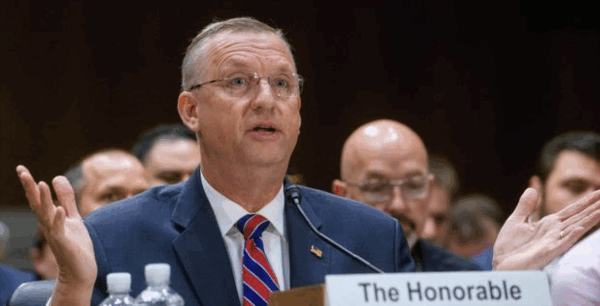
Collins testifies in Congress about VA job cuts (Photo: Rod Lamkey, Jr./AP)
During a heated congressional hearing on Tuesday, VA Secretary Doug Collins faced strong criticism as he defended the decision to eliminate thousands of jobs within the department. Meanwhile, Veterans and advocates protested outside the Capitol, voicing concerns that the proposed cuts would reduce access or quality of health care and benefits for millions who rely on the agency.
Collins told members of the Senate Veterans Affairs Committee that the VA is seeking to cut 15 percent of its workforce, or roughly 70,000 to 80,000 jobs, to make the agency more efficient. He claimed the cuts would not affect front-line care providers and would instead target nonessential roles such as interior designers and DEI staff. According to Collins, the savings would be reinvested into direct services for Veterans, including disability care and prosthetics.
Senators from both parties challenged Collins’ statements. Democratic lawmakers accused him of withholding key details and downplaying the impact of the job cuts. Sen. Richard Blumenthal (D-Conn.) called the hearing “a disgrace” and warned that gutting the agency would harm Veterans.
“Make no mistake, it is a disaster on the horizon,” he said.
Republicans acknowledged the VA’s problems but stopped short of condemning the cuts. Sen. Jerry Moran (R-KS) said the agency still needs reform and called the VA the second-largest bureaucracy in the federal government. Others on the panel, including Sen. Kevin Cramer (R-ND), questioned whether the hiring surge under the Biden administration had improved services. Collins responded that the addition of 52,000 jobs since 2021 had not fixed longstanding issues.
Outside the Capitol, Veterans joined members of Congress in a rally against the proposed reductions. Protesters claimed the cuts would pave the way for privatization while holding posters that read, “Veterans Healthcare Not For Sale.” Rep. Chris Deluzio (D-PA), a Navy Veteran, said the administration’s plan undermines recent progress made through the PACT Act, which expanded care to Veterans exposed to toxic substances.
“At this moment, we should be investing in the VA, not gutting it,” he told reporters.
A group of Veterans protest VA staffing cuts outside while Collins testifies in a congressional hearing. (Photo: Ashley Murray/States Newsroom)
In his testimony, Collins argued that reducing staff would eliminate waste and improve results. He pointed to $14 million saved by ending DEI programs, which he said had been redirected to Veterans in need. He also criticized the VA’s human resources department for inefficiencies, stating it took nearly two weeks to provide him with a full list of employees. He maintained that doctors, nurses, and claims processors would not be cut.
Democrats pushed back on that assertion. Sen. Elissa Slotkin (D-MI) questioned the claim that all 80,000 targeted jobs were in nonessential fields, saying she was not convinced that Veterans in her state would receive the same or better care under the plan. Blumenthal went on to say that administrative and support personnel are essential to guarantee appointments and service access. As Collins pledged that more details would be shared when internal reviews were complete, many lawmakers remained skeptical.
Veterans groups, including Common Defense, accused the department of trying to weaken the VA from within. Advocacy leader, Jose Vasquez, stated that although the administration refers to the action as “efficiency,” [some] Veterans view it as a betrayal.
Collins reiterated his stance, telling senators that reform is overdue and the VA is committed to improving care.
“We are not cutting health care or benefits,” he said. “We are making them better.”
With thousands of jobs already eliminated and more changes expected, the debate over the future of the VA appears far from over.